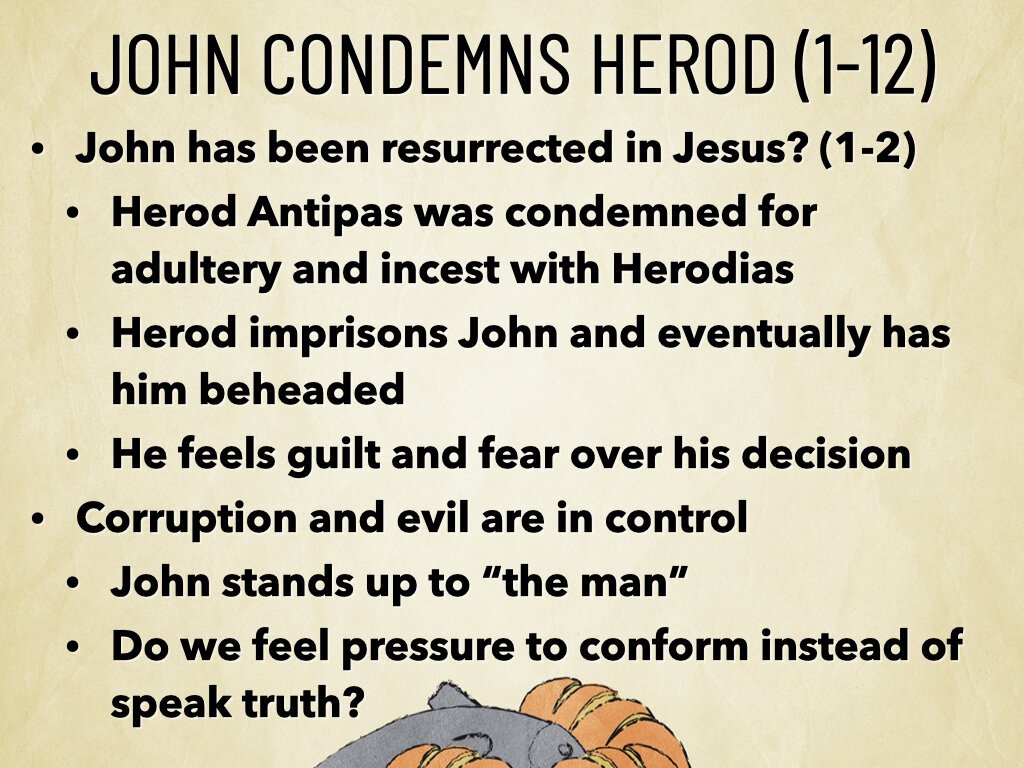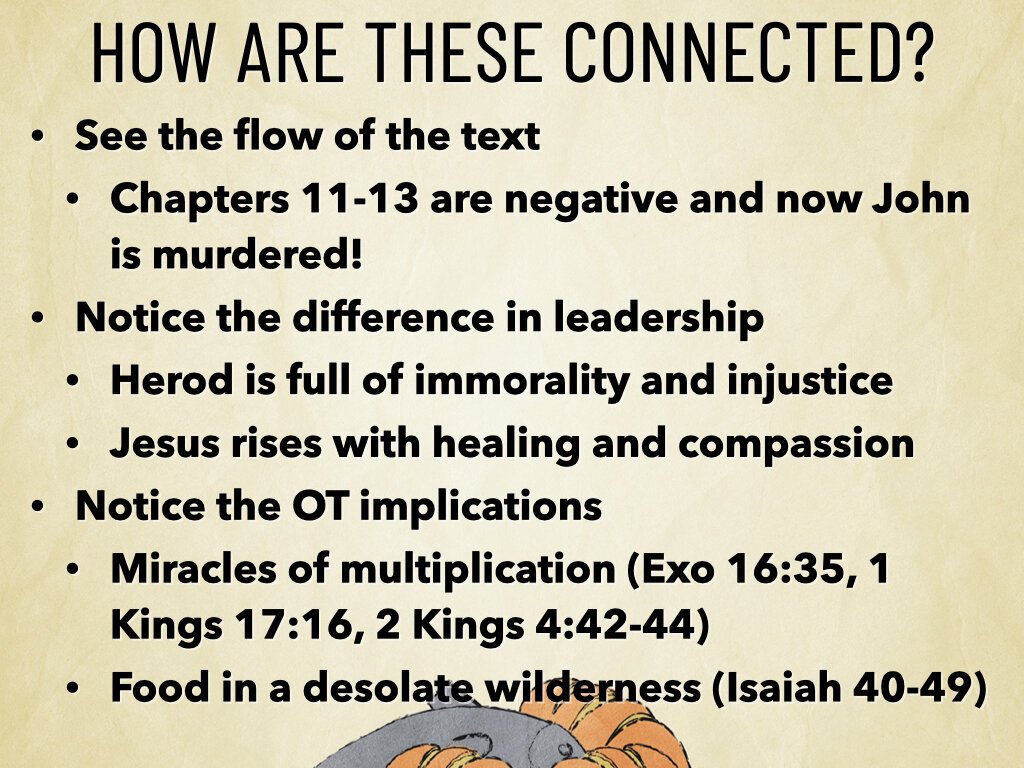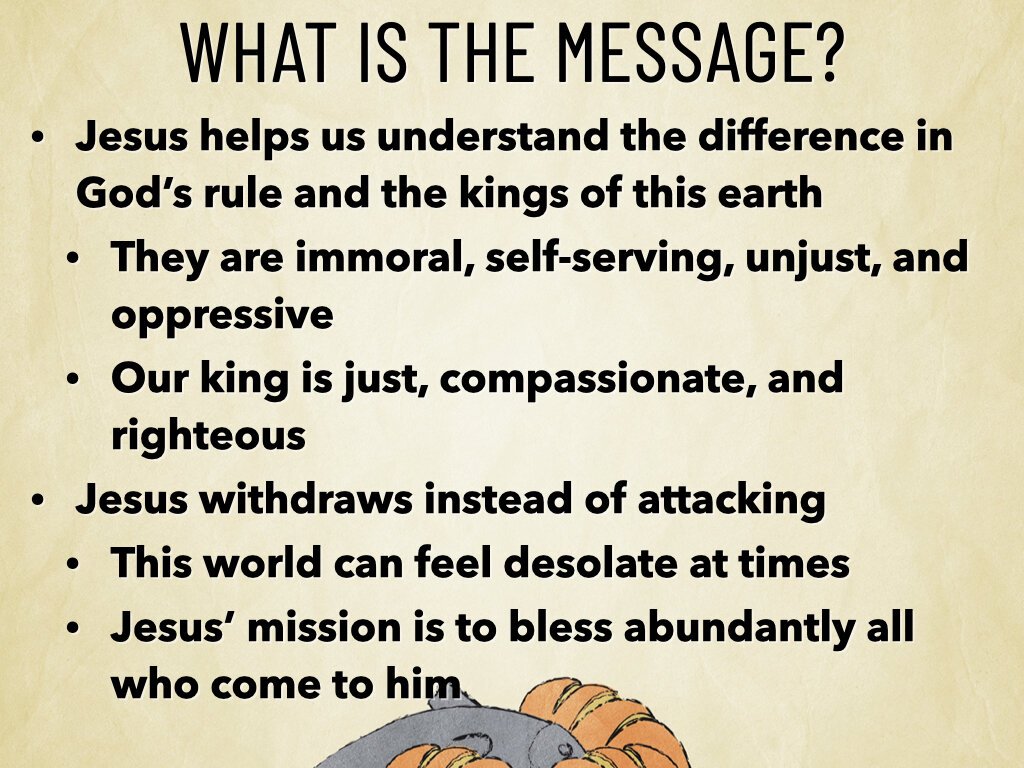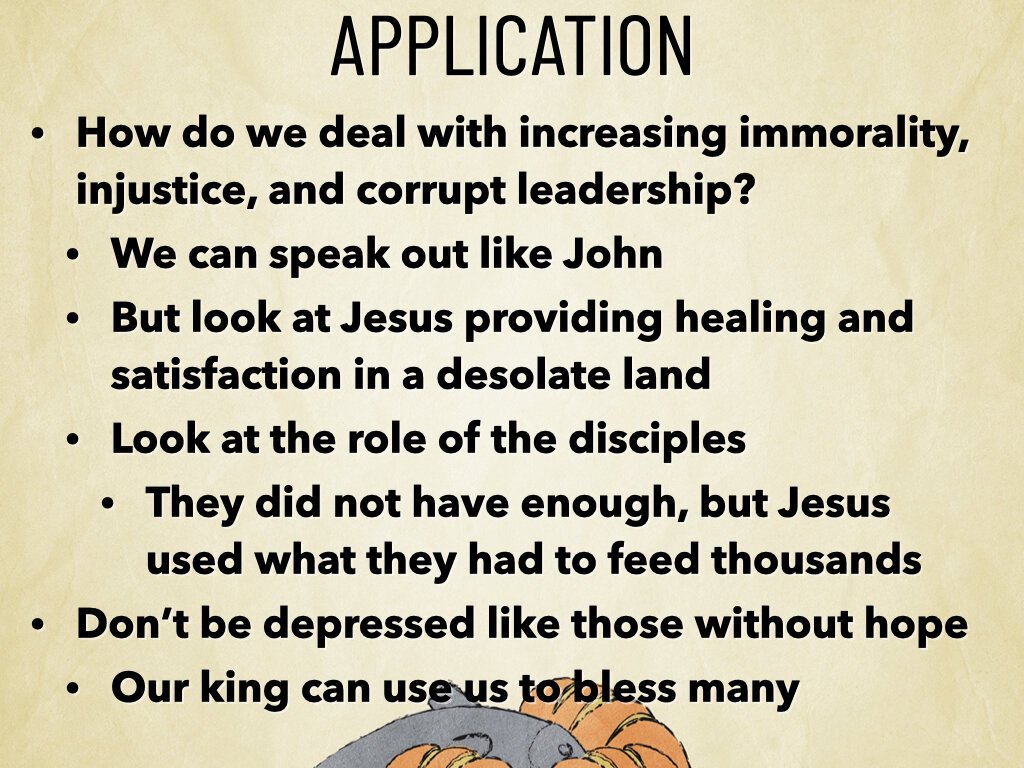A Desolate Place (Matthew 14:1-21)
September 20, 2020
Our society is becoming more and more godless, and our government is growing in corruption. The days ahead look dark and scary. What should we do in response? Should we speak out and condemn everyone who does evil? Should we withdraw into our little hole so that we are not bothered by these things? Maybe they will go away on their own. In the text we are looking at tonight, we will learn about this very important topic from Matthew 14.
Matthew 14:1--12 (ESV) --- 1 At that time Herod the tetrarch heard about the fame of Jesus, 2 and he said to his servants, “This is John the Baptist. He has been raised from the dead; that is why these miraculous powers are at work in him.” 3 For Herod had seized John and bound him and put him in prison for the sake of Herodias, his brother Philip’s wife, 4 because John had been saying to him, “It is not lawful for you to have her.” 5 And though he wanted to put him to death, he feared the people, because they held him to be a prophet. 6 But when Herod’s birthday came, the daughter of Herodias danced before the company and pleased Herod, 7 so that he promised with an oath to give her whatever she might ask. 8 Prompted by her mother, she said, “Give me the head of John the Baptist here on a platter.” 9 And the king was sorry, but because of his oaths and his guests he commanded it to be given. 10 He sent and had John beheaded in the prison, 11 and his head was brought on a platter and given to the girl, and she brought it to her mother. 12 And his disciples came and took the body and buried it, and they went and told Jesus.
John Condemns Herod
The first thing we see is that Herod the tetrarch is king. This is not the same Herod that wanted to kill the babies in Bethlehem. That was this Herod’s father. This Herod believes this is John the Baptist resurrected. That is kind of odd since we haven't read yet that John was killed. John has been a consistent character in Matthew's gospel. We saw him in Chapter 3 with Jesus' baptism, Chapter 11, sending his disciples to Jesus while in prison, and now we find out that he is dead. Herod the tetrarch was not king, but he had power. His full name is Herod Antipas, and he is well known in history for the events described here.
What happened? Herod Antipas was initially married to the daughter of the Nabatean king, Aretas IV. This was a marriage alliance with the Arab sub-nation. Herodias was also initially married to Phillip, Herod's brother. She was the daughter of another brother of Herod. That means that Herod was married to his niece and sister-in-law! But once they met, they fell in love and had to be together. So Herod divorced his wife, Herodias divorced her husband, and they were wed. This decision created instability and hurt Herod on several levels.
John the Baptist condemned Herod and Herodias' union. You don't criticize your tetrarch for marrying who he loves! Who cares what Leviticus 18:16 and 20:21 say! So Herod and Herodias have John put in prison and eventually have him beheaded. The events surrounding the beheading once again point to the immorality of this leader. He watches his niece/great-niece/stepdaughter dance a sensual dance and offers her up to half the kingdom. This is a lavish offering of a drunken man. In response, Herodias has her ask for John's head.
This is a sad ending to John's life, but this is how the world treats those who condemn them. Notice how John was unwavering in the face of an Ahab and Jezebel like figure. He rebuked a man for his divorce and incestuous relationship, and he paid the steepest price. There was no freedom of speech. Our culture pushes us to be silent and accept these kinds of flaws in our leaders. They pressure us to judge men and women based on standards that are not biblical. Everyone is told to put their trust in these men and women based on their ability and strengths to provide wealth, freedom, justice, and security in the land while overlooking their flaws. Maybe we should take advantage of our free speech and use it to condemn evil on every side, instead of ignoring it. It's not like we will lose our heads for it! Would John exalt any political leader today? No way! He wouldn't buy into the biased narrative on either side.
Jesus Feeds 5000
Now, Jesus should stand up and lead the people to overtake Herod and defeat injustice! Instead, Jesus is withdrawing to a desolate place. He does not follow in the steps of John.
Matthew 14:13--21 (ESV) --- 13 Now when Jesus heard this, he withdrew from there in a boat to a desolate place by himself. But when the crowds heard it, they followed him on foot from the towns. 14 When he went ashore he saw a great crowd, and he had compassion on them and healed their sick. 15 Now when it was evening, the disciples came to him and said, “This is a desolate place, and the day is now over; send the crowds away to go into the villages and buy food for themselves.” 16 But Jesus said, “They need not go away; you give them something to eat.” 17 They said to him, “We have only five loaves here and two fish.” 18 And he said, “Bring them here to me.” 19 Then he ordered the crowds to sit down on the grass, and taking the five loaves and the two fish, he looked up to heaven and said a blessing. Then he broke the loaves and gave them to the disciples, and the disciples gave them to the crowds. 20 And they all ate and were satisfied. And they took up twelve baskets full of the broken pieces left over. 21 And those who ate were about five thousand men, besides women and children.
Consider the repetition in this text of the word desolate. Desolate means that it had nothing and no one. It is a place that would be abandoned and empty. Verse 19 tells us that the people sat down on the grass, so it wasn't like a desert region, but it was not populated. Have you ever been out in the middle of nowhere? It feels very lonely and separated. Why would Jesus go there? Maybe he was trying to escape from Herod's pursuit, perhaps he was trying to be alone to grieve John's loss, or it could be that he just needed to get away and clear his head. Later, we find out that he got away, hoping that he could spend time in prayer (23).
Instead of getting time alone, he is bombarded by a crowd wanting to be healed. But, he sees sick people and has compassion for them. Notice that he ends up working with them all day and into the evening. His disciples request Jesus to send the crowds away to buy food for themselves. They are practical. It will be challenging in a desolate place to find food for ten thousand people (men, women, and children). Except Jesus tells the disciples, "You give them something to eat." How would you feel if you were a disciple at that point? The other prominent religious leader has been executed for speaking the truth. You are in a desolate place with thousands of people and enough food to feed your small group (five loaves and two fish). These people will go hungry. But the disciples are commanded to give their food to Jesus. There are no grocery stores or convenience stores around. We might be afraid to share our food with the people. But Jesus multiplies the bread to feed thousands of people. Every person ate and was satisfied.
What Is The Connection?
As we look at these two sections, we might wonder, "How are these two events connected?" If we have studied the Bible very much, we might be familiar with both stories. But have we ever considered them together. I would like for us to take a step back and see the flow of this text. In Chapter 11, we see John's disciples bringing word that John doubts Jesus is the Messiah because he doesn't judge the nation. Chapter 12 is about the Pharisees accusing Jesus of breaking the law and serving Satan. The last chapter was about Jesus teaching with parables because the crowds won't listen to him. Then, he goes to his home town, and they won't listen to him either. Now John the Baptist dies at the hands of Herod, the tetrarch. This has been a very negative section of this book. Everything seems to be going wonky. Then, all of a sudden, we have Jesus going out to a desolate place and feeding the five thousand+ in a miraculous multiplication of bread and fish. Do you see the transition that has happened here?
Amid all this negative, Jesus rises unexpectedly. He doesn't focus on the evil of his corrupt government. He focuses on the needs of an oppressed people. John dying in this way would be emblematic of his own death that is still to come, but it would also be the spark for Jesus to work some mighty miracles. Jesus followed John in spreading the good news, and now he will stand alone as the prophet and Messiah God has always intended.
Think about the way this miracle lines up with the Old Testament. Through Moses, God gave the people manna from heaven while wandering in the wilderness for forty years (Exodus 16:35). For Elijah, God multiplied the flour and oil (1 Kings 17:16). God has shown that he can multiply food to provide for the hungry. But when we look more closely at Elisha's multiplying miracle, we notice quite a few similarities.
2 Kings 4:42--44 (ESV) --- 42 A man came from Baal-shalishah, bringing the man of God bread of the firstfruits, twenty loaves of barley and fresh ears of grain in his sack. And Elisha said, “Give to the men, that they may eat.” 43 But his servant said, “How can I set this before a hundred men?” So he repeated, “Give them to the men, that they may eat, for thus says the Lord, ‘They shall eat and have some left.’ ” 44 So he set it before them. And they ate and had some left, according to the word of the Lord.
Notice how he says the same thing Jesus said, and the disciple didn't understand God's power in Elisha. This miracle signifies that Jesus is like Elisha. If you remember our overview of 2 Kings, Elisha was supposed to put everyone to death. Instead, he primarily heals and helps the people get through famines during the evil reign of Ahab and Jezebel.
Beyond the Elisha shadow, we have the book of Isaiah. Isaiah spends much of the second half of his book describing the Messiah. One of the significant themes in Chapters 40-49 depicts Israel as a barren, desolate wilderness where nothing grows, and no one wants to come to. (Isaiah 40:3-5, 43:19, 44:3-5, 49:8-11, 14-16)
Isaiah 40:3--5 (ESV) --- 3 A voice cries: “In the wilderness prepare the way of the Lord; make straight in the desert a highway for our God. 4 Every valley shall be lifted up, and every mountain and hill be made low; the uneven ground shall become level, and the rough places a plain. 5 And the glory of the Lord shall be revealed, and all flesh shall see it together, for the mouth of the Lord has spoken.”
We could go to twenty or thirty other passages like this, where God promises to turn the desolate places into a fruitful field and provide for the people in a desolate land. There is no doubt that Jesus is fulfilling the Old Testament.
What's The Message?
We might look at this miracle and remember learning about it in our Bible classes as children. It's a really cool story that shows us that Jesus was the Messiah. But do we see the connection with Jesus providing for Israel in the wilderness?
This is the time for God's servant to rise and build his kingdom in a desolate place. We get no hint of an army. Jesus does not speak out against the injustice of Herod like John. They may be expecting him to reveal a plan to conquer, but he doesn't go down that path. Instead, he helps us understand the difference in God's rule and Herod's. Herod represents all of the kings and rulers of this world. They are immoral, self-serving, and oppressive. Jesus is not like them. He will rule with justice, compassion, and righteousness. Jesus satisfies the crowds that come to him and provides what they need in a desolate land. This shows us that God desires to bless his people through his servant.
Herod's rule and the rule of any corrupt government in this world make the righteous feel like they are all alone in a desolate place. The wicked aren't supposed to succeed. Everything is wrong in the world. Why does John have to die? Why doesn't God make this right? Notice that Jesus doesn't storm Herod's fortress and demand justice. We see that the evil in this world saddens Jesus, but it motivates him to be a blessing for God's people. That is his focus. Speaking out against the immorality of Herod doesn't accomplish his mission to seek and save the lost.
Application
As we live in an increasingly corrupt society with corrupt political leaders, can we learn anything from these events? How do we deal with an increasingly unjust society and corrupt leadership? We can speak out against it like John. There is nothing unrighteous about what John was doing. But notice the good news of this passage. The disciples couldn’t do anything to help the people. They didn’t have anything to feed them. But God provides restoration and rejuvenation to the oppressed in a desolate land. We desperately need God’s restoration and renewal.
Look at the role of the disciples. The disciples don't feel like what they have is adequate. They fail to see how God will bless them with much more than what they have to bring about the spread of God's glory. God always does that. He always uses something that seems small and insignificant to bless his people and glorify his name. Notice that Jesus didn't hand a single piece of bread to the people. He thanks God for it and passes it to his disciples. Isn't that an illustration of our mission? We are here to spread the eternal blessings that come from God. This should be our focus.
God wants to bless the oppressed through you. Maybe we are depressed and discouraged by how bad our country is getting, but we need to shift our focus on the spiritual needs of those around us. Don't let the depression of those without hope depress you! Jesus commands us to give them something to eat. He wants all men everywhere to be restored and rejuvenated by the gospel. Those who pursue God see corruption, and they are starving for something that makes sense. Will we give it to them?
Conclusion
If you are here today, and you are starving for something that satisfies, Jesus offers us what we need. In this world, we have worry and anxiety, but Jesus sees our needs and feels compassion toward us. He wants to provide because he is the righteous king. He promises to fix the corruption at the end of the age, but until then, he blesses us in the situation we are in.
In a horrible world, God's people can find the blessing of satisfaction and peace. We need to rely on him to restore our souls and the souls of those around us. Our goal is not to fix our government but to spread the bread of life to those around us. If we fulfill God's purpose, we can be satisfied under a corrupt and evil government. The word tells us that there is coming a day when we will live eternally in the presence of God without any more injustice, oppression, corruption, desolation, or loneliness. Won't it be wonderful there? Are our eyes fixed on that hope? Do we believe God's promise and look forward to the final restoration?
I hope and pray that God will heal the many corrupt governments in the world, but my goal is not to accomplish that. That's God's business. If we are not satisfied, maybe the reason is that we are not being fed by Jesus in the desolate place and fulfilling God's purpose. Maybe we have joined ourselves to a group of evil people so that we don't feel so alone.






